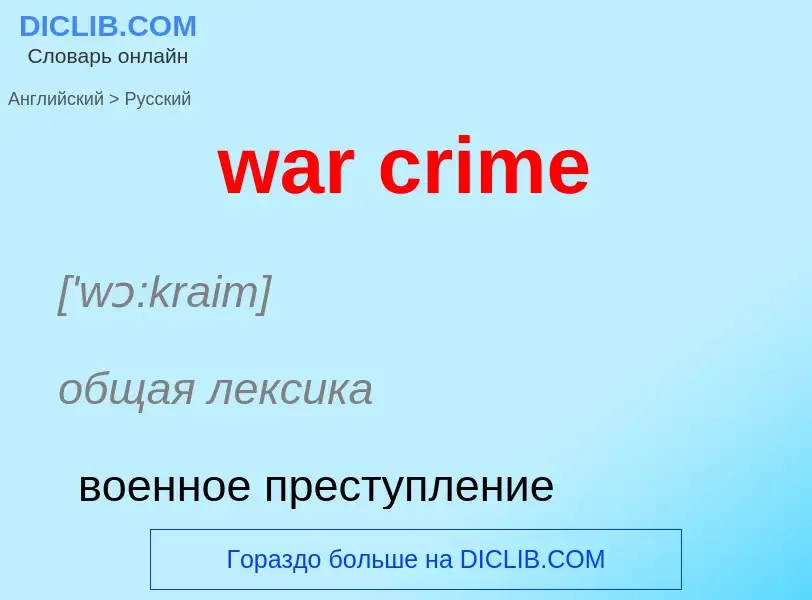Μετάφραση και ανάλυση λέξεων από την τεχνητή νοημοσύνη ChatGPT
Σε αυτήν τη σελίδα μπορείτε να λάβετε μια λεπτομερή ανάλυση μιας λέξης ή μιας φράσης, η οποία δημιουργήθηκε χρησιμοποιώντας το ChatGPT, την καλύτερη τεχνολογία τεχνητής νοημοσύνης μέχρι σήμερα:
- πώς χρησιμοποιείται η λέξη
- συχνότητα χρήσης
- χρησιμοποιείται πιο συχνά στον προφορικό ή γραπτό λόγο
- επιλογές μετάφρασης λέξεων
- παραδείγματα χρήσης (πολλές φράσεις με μετάφραση)
- ετυμολογία
war crime - translation to ρωσικά
['wɔ:kraim]
общая лексика
военное преступление
Ορισμός
Βικιπαίδεια

A war crime is a violation of the laws of war that gives rise to individual criminal responsibility for actions by combatants in action, such as intentionally killing civilians or intentionally killing prisoners of war, torture, taking hostages, unnecessarily destroying civilian property, deception by perfidy, wartime sexual violence, pillaging, and for any individual that is part of the command structure who orders any attempt to committing mass killings including genocide or ethnic cleansing, the granting of no quarter despite surrender, the conscription of children in the military and flouting the legal distinctions of proportionality and military necessity.
The formal concept of war crimes emerged from the codification of the customary international law that applied to warfare between sovereign states, such as the Lieber Code (1863) of the Union Army in the American Civil War and the Hague Conventions of 1899 and 1907 for international war. In the aftermath of the Second World War, the war-crime trials of the leaders of the Axis powers established the Nuremberg principles of law, such as that international criminal law defines what is a war crime. In 1949, the Geneva Conventions legally defined new war crimes and established that states could exercise universal jurisdiction over war criminals. In the late 20th century and early 21st century, international courts extrapolated and defined additional categories of war crimes applicable to a civil war.


![Japanese soldiers]] in [[Suzhou]], China, 1938 Japanese soldiers]] in [[Suzhou]], China, 1938](https://commons.wikimedia.org/wiki/Special:FilePath/Chinese killed by Japanese Army in a ditch, Hsuchow.jpg?width=200)
![date=July 22, 2015 }}". [[Deutsche Welle]]. June 30, 2015.</ref> date=July 22, 2015 }}". [[Deutsche Welle]]. June 30, 2015.</ref>](https://commons.wikimedia.org/wiki/Special:FilePath/Destroyed house in the south of Sanaa 12-6-2015-3.jpg?width=200)
![Bodies of some of the hundreds of Vietnamese villagers who were killed by U.S. soldiers during the [[My Lai Massacre]] Bodies of some of the hundreds of Vietnamese villagers who were killed by U.S. soldiers during the [[My Lai Massacre]]](https://commons.wikimedia.org/wiki/Special:FilePath/My Lai massacre.jpg?width=200)
![Palmiry]] near [[Warsaw]] in 1940 for mass execution (''[[AB-Aktion]]'') Palmiry]] near [[Warsaw]] in 1940 for mass execution (''[[AB-Aktion]]'')](https://commons.wikimedia.org/wiki/Special:FilePath/Polish hostages preparing by Nazi Germans for mass execution 1940.jpg?width=200)
![[[Bodo League massacre]] during the Korean War in 1950 [[Bodo League massacre]] during the Korean War in 1950](https://commons.wikimedia.org/wiki/Special:FilePath/Prisoners on ground before execution,Taejon, South Korea.jpg?width=200)
![[[2013 Shahbag protests]] demanding the death penalty for the war criminals of the 1971 [[Bangladesh Liberation War]] [[2013 Shahbag protests]] demanding the death penalty for the war criminals of the 1971 [[Bangladesh Liberation War]]](https://commons.wikimedia.org/wiki/Special:FilePath/Sahbag.jpg?width=200)
![Soviet POWs died in Nazi custody]]. Soviet POWs died in Nazi custody]].](https://commons.wikimedia.org/wiki/Special:FilePath/Soviet soldiers mass grave, German war prisoners concentration camp in Deblin, German-occupied Poland.jpg?width=200)
